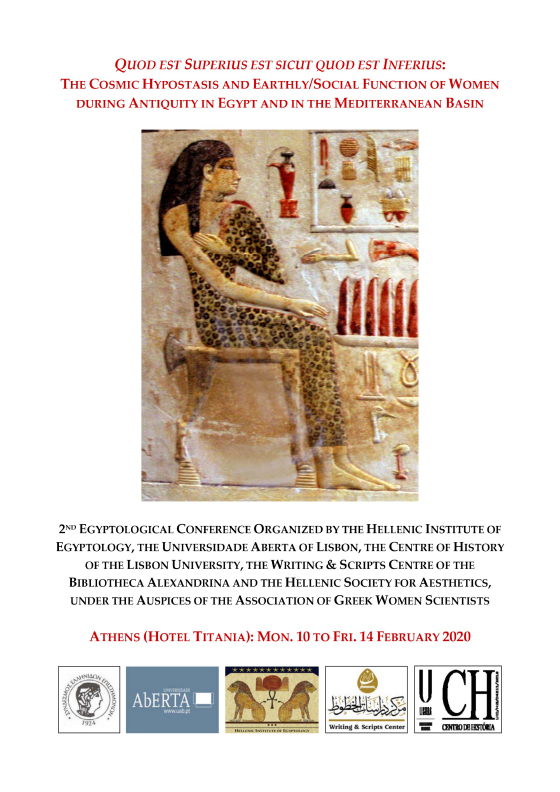2nd Athens Conference of the Hellenic Institute of Egyptology | Quod est Superius est sicut quod est Inferius: The Cosmic Hypostasis and Earthly/Social Function of Women during Antiquity in Egypt and in the Mediterranean Basin
Hellenic Institute of Egyptology, Athens, 10-14 February 2020
Organização | Hellenic Institute of Egyptology; Universidade Aberta; Centre of History of the University of Lisbon; Writing & Scripts Centre of the Bibliotheca Alexandrina, Hellenic Society for Aesthetics, & c., under the Auspices of the Association of Greek Women Scientists

Deadline for submission of proposals: 30th April 2019 We are very pleased to invite you to the 2nd Athens Conference of the Hellenic Institute of Egyptology. After the great success of our 1st Athens Conference (1st-3rd February 2017) and due to the great quadrennial Conference of the IAE that will take place in Cairo during November 2019, we decided to place this Conference in February 2020.
The significance of the Woman, as the only human being that can re–create life from her womb, as an archetype of cosmic immanence, fluidity and power, as well as a social being whose position in ancient societies (e.g.: the Egyptian) was much better than in others of Antiquity (e.g.: in ancient Athens) and also in our current era, is not only extremely important, but rather crucial and determinative for the flow and development of History itself. Not only were Women the mothers, sisters or wives of «important men», but they also were the creators of high culture, civilization and children useful for society. They were Empresses, Queens, Princesses and even Pharaohs, but at the same time a multitude of Women, from the socially «lower» strata, was the important dough for the evolution and developments in society and culture. In the course of time, they also suffered under patriarchy and were both psychically and physically tormented not only by evil men and habits, but also by females who were repeating and disseminating the patterns of patriarchy and the submission of Women to men, hidden behind supposedly Divine–given rules and fanatic doctrines, suppressing their freedom and even mutilating their genitals … However, Women survived and most of us are happy today, living in a modern world, where not only Feminism per se, but also deep understanding of the situation and sincere human/humanitarian feelings are also explicitly shown by several men, mainly in Western Societies. Regrettably, however, many Women still suffer in several of the so–called «underdeveloped» countries, especially under the fanatic application of the rules of certain religions.
Ladies in Heaven, but Women on Earth? The hypostasis of Women in ancient Egypt and in the Mediterranean Basin, but also its possible relations to Jung’s Psychology: from the distant past, until now, the Archetype of Femininity, the Sacred Female, the Great Mother, Virgin and Crone, is one of the most precious and catalytic in the Jungian Collective Unconscious, being at the same time the true vis vitalis for the societal processes that motivate History and cultural evolution. This is the theme of our 2nd Conference, which shall also try to focus on patterns of continuity and transformation of various related institutions, habits and archetypes, covering almost the whole Antiquity from the Pre–Dynastic down to the Late, Ptolemaic and Coptic Period (corresponding for all the other cultures to the time–span from c. 3000 BC to the four initial Centuries AD), whose specific topics and thematology shall be the following:
Manifestation & Cosmic Immanence of the Sacred Female
Divine Female Archetypes
The Earthly/Social Status of Women in Ancient Egypt
The Earthly/Social Status of Women in the Mediterranean Basin
Key–Role Individual Women
Epigraphic, Literary and Linguistic Sources:.
The Earthly/Social and Heavenly Status of Women in Coptic Egypt
Aesthetics, Beauty and Women
Gender Studies
The official languages of the Conference will be English and French.
For further queries and submission of proposals, please contact hieg-aker.org@otenet.gr or s.tsourinaki@yahoo.com
More information:
Official webpage
Download Call for Papers

